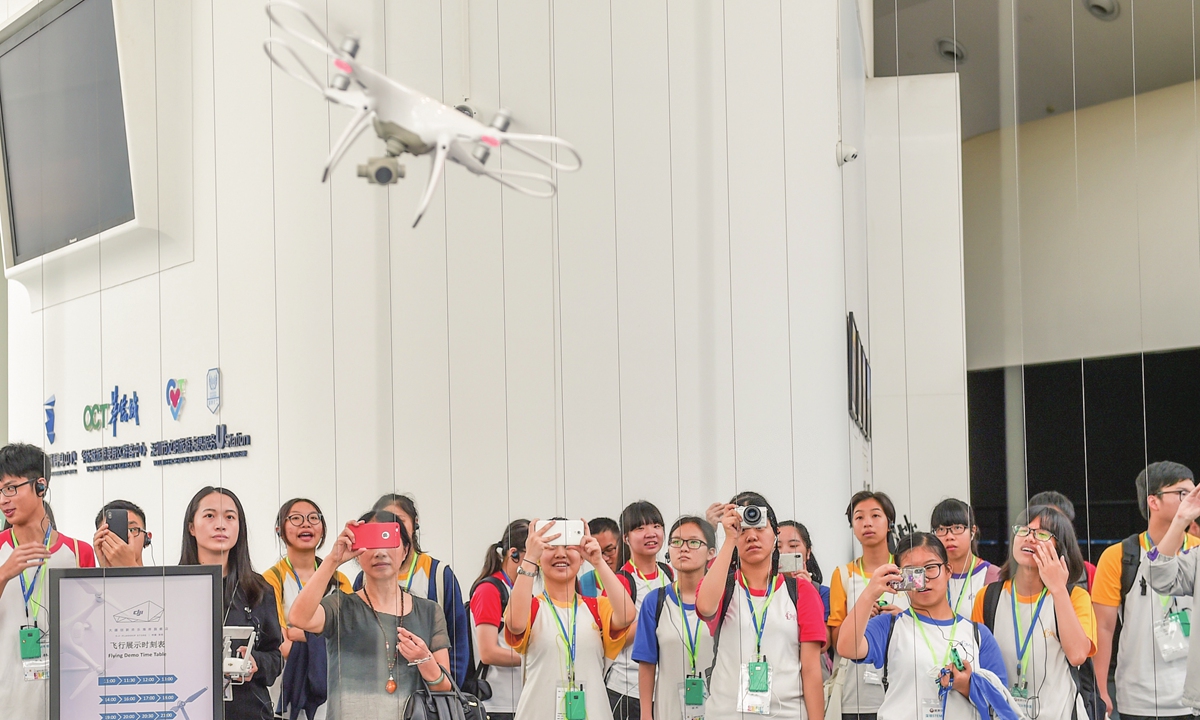More HK students are expected to choose the Chinese mainland for higher studies as preferential policies introduced

Students and teachers from Hong Kong visit a DJI flagship shop in Shenzhen, South China’s Guangdong Province during a tour to witness the achievements of China’s reform and opening-up in June 2018. File Photo: Xinhua
With one day left before the results of Hong Kong Diploma of Secondary Education Examination (DSE) are released, some experts believe that the Chinese mainland will remain the first choice for secondary school graduates in Hong Kong as the mainland can offer high quality education resources, a safe environment with the pandemic basically under control, and more chances for employment with preferential policies recently introduced.
The insiders' remarks came after Carrie Lam, Chief Executive of the Hong Kong Special Administrative Region (HKSAR) cheered students waiting for the release of the DSE results during a press conference on Tuesday.
Lam encouraged the students to keep an eye open for mainland as their next study destination. According to Lam, under the support of China's Ministry of Education, 127 mainland universities will welcome Hong Kong students with DSE who are exempted from the gaokao (the national college entrance examination), including most of the top academic institutions in the country.
The top schools in the mainland will also accept recommendations from presidents of Hong Kong schools and provide special quotas for students from the HKSAR, according to Lam.
Data from the Hong Kong Education Bureau released in April shows that among the 44,186 secondary school graduates in 2020 who responded to a survey, 14.5 percent pursued full-time studies outside Hong Kong, among whom 31.1 percent went to the mainland, followed by 26.2 percent to the island of Taiwan and 2.6 percent to the US.
Experts said this year the mainland is very likely to remain the first choice for Hong Kong students pursuing full-time studies outside Hong Kong.
Li Xiaobing, expert on Hong Kong, Macao and Taiwan from Nankai University, told the Global Times on Tuesday that more Hong Kong students are expected to go to the mainland this year for further study and development .
While many areas outside the Chinese mainland are still struggling with the shock of the pandemic, students can feel free to meet face-to-face and enjoy a safe environment in the mainland, which is one of the main attractions of mainland universities for Hong Kong students, Li explained.
Also, the quality of the education in the mainland has improved in recent years, which has been recognized by the international community, Li noted. The position of mainland universities in the QS World University Rankings 2021 rose and now four Chinese universities made it into the top 50 list.
In addition, there are many preferential policies for Hong Kong students and job hunters. They can enjoy special opportunities for improvement and take advantage of channels to find employment in the mainland, Li noted.
Media reported on Monday that the Guangdong-Hong Kong-Macao Greater Bay Area has opened more than 9,000 jobs in public institutions for young people from Hong Kong and Macao.
Hong Kong residents that want to study and work in the mainland can "get on the express train" of rapid development of the Greater Bay Area. Growing numbers of Hongkongers have realized this, Li said.
Lawrence Tang Fei, principal of the Heung To Secondary School (Tseung Kwan O) in Hong Kong, told the Global Times that the education sector should help young people broaden their career paths, not only limiting them to Hong Kong but also eying the mainland for their career plan, which can ensure the individual and national development under the principle of "one country, two systems."
It is a good start for Hong Kong students to integrate into the national development and foster a stronger sense of national identity, Tang said.

